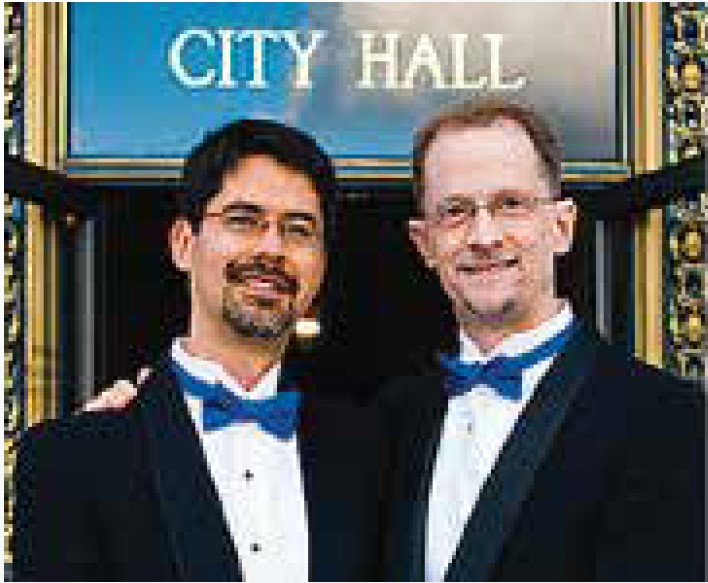
By John Lewis and Stuart Gaffney–
His words were searing. “I would hate it if [an LGBTQ couple] lived next to me. I would hate to even see [them].” So remarked Masayoshi Arai, Executive Secretary and close aide to Japanese Prime Minister Fumio Kishida, to reporters on February 3. And that was not all. He further opined that if Japan were to have marriage equality, “some people will abandon the country.”
Kishida fired Arai the next day, claiming that his ruling conservative Jimintō party (also known as the LDP) sought to create “a sustainable and inclusive society in which diversity is recognized.” But Arai’s words ignited a firestorm here in Japan. They tore something open. The underlying queerphobia at the top of Jimintō that for years has blocked passage of LGBTIQ rights in the country was laid bare for all to see.

The prime minister’s remarks after firing Arai also seemed to ring hollow to many. Just two days before Arai made his comments, Kishida himself prevaricated when an opposition member of the Diet (Japanese Parliament) confronted him about the government’s inaction on marriage equality. The prime minister replied that it was a topic to be considered “very carefully,” claiming that permitting loving, committed LGBTQ couples to marry would “change people’s perception of family, values, and society.” It was typical verbiage that Kishida and prior Jimintō leaders have repeated for years now, even as public opinion polling indicates that substantial majorities of the Japanese population support marriage equality.
And it comes on the heels of Kishida last year delivering a slap in the face to the Japanese queer community when, in a cabinet reshuffle in the wake of the Unification Church scandal, Kishida elevated two Jimintō members who were notorious for scurrilous anti-gay remarks that they had made. One was Mio Sugita, who was appointed Parliamentary Vice-Minister for Internal Affairs and Communications. In 2018, she accused LGBTIQ people of not being “productive,” based on her ignorant belief that queer people could not have children. Sugita had also taken numerous anti-LGBTIQ positions and made very public remarks against ethnic minorities in Japan as well as women. Sugita herself was forced to resign late last year because she refused to retract or apologize for a number of her remarks.

The other was Kazuo Yana, who was appointed State Minister of Education, Culture, Sports, Science & Technology. In 2021, Yana declared that LGBTIQ people are against “preservation of the species in terms of biology.” Yana remains in office.
In an attempt to quell the firestorm over Arai’s remarks, Jimintō agreed reluctantly to reopen discussions for submission of a stalled bill that would merely “promote understanding” of LGBTIQ people among the public, but contained no substantive anti-discrimination provisions. At a February 14th rally and press conference, LGBTIQ activists and opposition Diet members fired back: “We don’t need understanding. We need an anti-discrimination law.” One activist pointed out incisively that Aria’s comments revealed that it was the Jimintō leadership, not the general public, that needed to learn understanding.
Indeed, many diverse LGBTIQ and allied advocates spoke passionately at the event. Addressing another Jimintō claim that passing LGBTIQ rights legislation could polarize society, a Diet member explained that anti-discrimination laws did not divide society, but that discrimination itself does. A queer activist, whose entire face was masked to disguise her personal identity out of fear of discrimination, explained that Jimintō’s inaction had normalized the notion that LGBTIQ people would have no legal rights in Japan.
An LGBTIQ professor elucidated that for far too long the majority population and their needs and attitudes had been the subject of the legislative process, relegating queer people and other minorities to the position of mere objects. It was now time for LGBTIQ people and other minorities themselves to be the subject of legislation that would value and protect their lives. Another activist pleaded “how much harder” do we have to work to try to get legal rights—what more do we need to do?—“isn’t it the government’s responsibility to protect our rights as citizens?”

A Japanese LGBTIQ advocate of Korean descent linked hate speech against Japanese of Korean ancestry to Arai’s remarks, which the activist characterized as hate-speech against LGBTIQ people from the top of the Japanese government. Others spoke about the impact of the remarks on the emotional health of LGBTIQ youth, many of whom experience depression and suicidal ideation, and in the words of one speaker were “suffocating” and in need of clean air to breathe.
One of the last speakers, a queer sex-worker activist, brought it back to Arai’s words themselves in a very personal way. Speaking to Aria rhetorically, they said: “Would you feel disgust if you saw me? … I wouldn’t look with disgust at you.”
The Associated Press reported that the day after the press conference, U.S. Ambassador to Japan Rahm Emanuel weighed in, expressing “’full confidence’” that the Japanese government will take the necessary steps to ban discrimination against LGBTQ people.”
The pressure is on. The eyes of the world will turn to Japan when the nation hosts the annual G7 Summit in Hiroshima in May. There’s no time to waste for equality.
John Lewis and Stuart Gaffney, together for over three decades, were plaintiffs in the California case for equal marriage rights decided by the California Supreme Court in 2008. Their leadership in the grassroots organization Marriage Equality USA contributed in 2015 to making same-sex marriage legal nationwide.
6/26 and Beyond
Published on February 23, 2023
Recent Comments